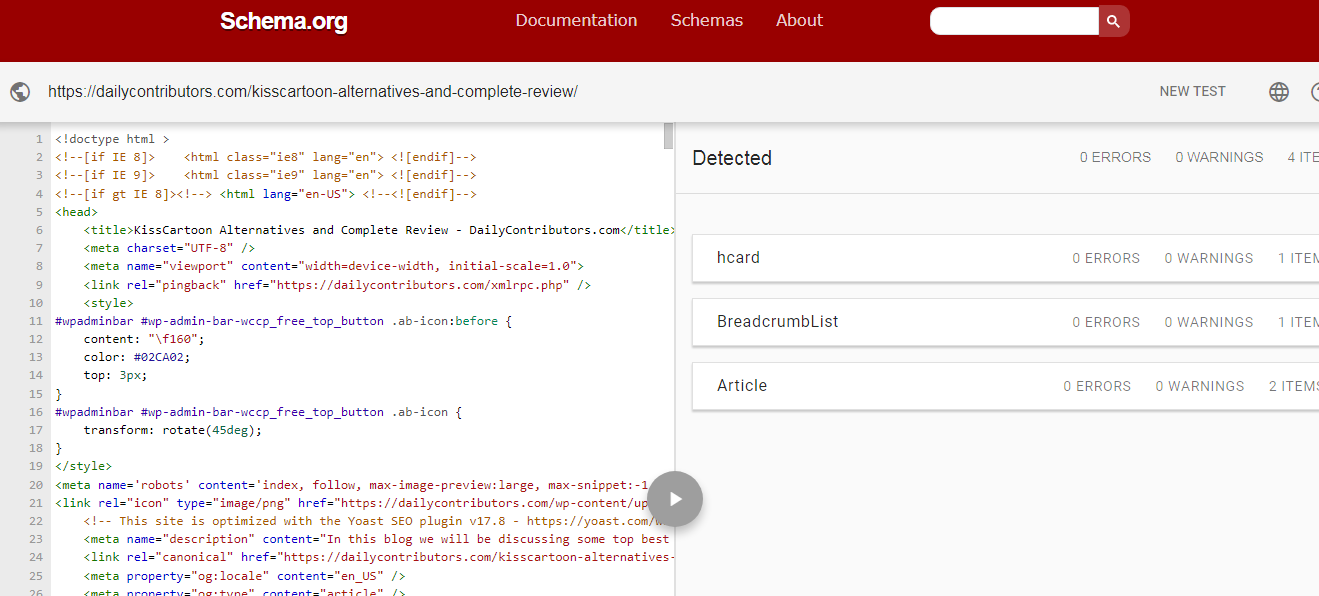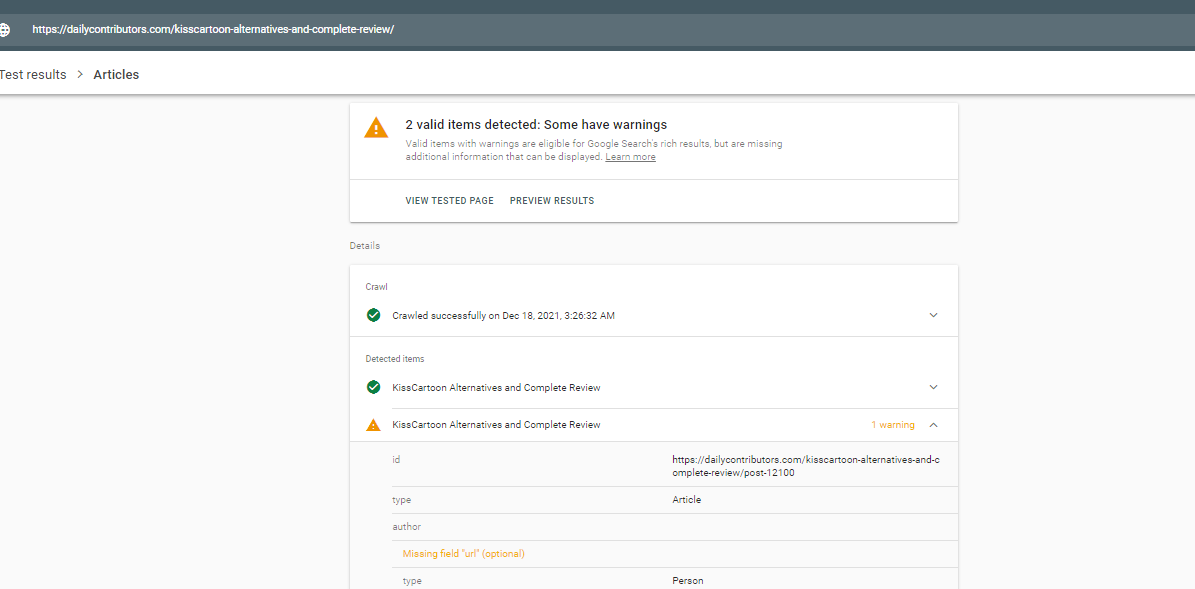Moz Q&A is closed.
After more than 13 years, and tens of thousands of questions, Moz Q&A closed on 12th December 2024. Whilst we’re not completely removing the content - many posts will still be possible to view - we have locked both new posts and new replies. More details here.
Schema Markup Warning "Missing field "url" (optional)"
-
Hello Moz Team, I hope everyone is doing well & good,
I need bit help regarding Schema Markup, I am facing issue in my schema markup specifically with my blog posts,
In my majority of the posts I find error "Missing field "url" (optional)"
As this schema is generated by Yoast plugin, I haven't applied any custom steps.Recently I published a post
https://dailycontributors.com/kisscartoon-alternatives-and-complete-review/
and I tested it at two platforms of schema test
1, Validator.Schema.org
2. Search.google.com/test/rich-resultsSo the validator generate results as follows and shows no error

It shows no error
But where as

in search central results it gives me a warning "Missing field "url" (optional)".
So is this really be going to issue for my ranking ? Please help thanks!
-
@JoeySolicitor I thinks , My website sam with your issue
Browse Questions
Explore more categories
-
Moz Tools
Chat with the community about the Moz tools.
-
SEO Tactics
Discuss the SEO process with fellow marketers
-
Community
Discuss industry events, jobs, and news!
-
Digital Marketing
Chat about tactics outside of SEO
-
Research & Trends
Dive into research and trends in the search industry.
-
Support
Connect on product support and feature requests.
Related Questions
-
Unsolved Duplicate LocalBusiness Schema Markup
Hello! I've been having a hard time finding an answer to this specific question so I figured I'd drop it here. I always add custom LocalBusiness markup to clients' homepages, but sometimes the client's website provider will include their own automated LocalBusiness markup. The codes I create often include more information. Assuming the website provider is unwilling to remove their markup, is it a bad idea to include my code as well? It seems like it could potentially be read as spammy by Google. Do the pros of having more detailed markup outweigh that potential negative impact?
Local Website Optimization | | GoogleAlgoServant0 -
What do we know about the "Shops" SERP Feature?
I came across this SERP Feature in a search today on a mobile device. It does not show for the same search query on desktop. What do we know about this "Shops" SERP feature? shops-blur.jpg
SERP Trends | | seoelevated0 -
Schema markup for products is missing "price": Is this bad?
Hey guys, So a current client of mine has an e-commerce shop with a few hundred products. They purposely choose to keep the prices off of their website, which is causing errors in Google Webmaster Tools. Basically the error shows: Error: Structured Data > Product (markup: schema.org) Error type: missing price 208 items with error Is this a huge deal? Or are we allowed to have non-numerical prices for schema ie. "call for quote"
Technical SEO | | tbinga1 -
Special characters in URL
Will registered trademark symbol within a URL be bad? I know some special characters are unsafe (#, >, etc.) but can not find anything that mentions registered trademark. Thanks!
Technical SEO | | bonnierSEO0 -
Google's "cache:" operator is returning a 404 error.
I'm doing the "cache:" operator on one of my sites and Google is returning a 404 error. I've swapped out the domain with another and it works fine. Has anyone seen this before? I'm wondering if G is crawling the site now? Thx!
Technical SEO | | AZWebWorks0 -
How valuable is content "hidden" behind a JavaScript dropdown really?
I've come across a method implemented by some SEO agencies to fill up pages with somehow relevant text and hide it behind a javascript dropdown. Does Google fall for such cheap tricks? You can see this method used on these pages for example (just scroll down to the bottom) - it's all in German, but you get the idea I guess: http://www.insider-boersenbrief.de/ http://www.deko-und-kerzenshop.de/ How is you experience with this way of adding content to a site? Do you think it is valuable or will it get penalised?
Technical SEO | | jfkorn0 -
404 crawl errors from "tel:" link?
I am seeing thousands of 404 errors. Each of the urls is like this: abc.com/abc123/tel:1231231234 Everything is normal about that url except the "/tel:1231231234" these urls are bad with the tel: extension, they are good without it. The only place I can find this character string is on each page we have this code which is used for Iphones and such. What are we doing wrong? Code: Phone: <a href="[tel:1231231234](tel:7858411943)"> (123) 123-1234a>
Technical SEO | | EugeneF0 -
Using Schema.org: Product or Event as the schema type?
Hello, Most of you heard from the launch of the new format for microdata: Schema.org and my question is about the different types of Schema they provide. Our websites provide an overview of courses, visitors can search/filter training courses and most important: read peer reviews. Until now we formatted (the source) of those courses with the schema type "Product" because it allows us to provide search engines with metadata about reviews via the "Aggregrated Rating". Recently we updated the information about courses, to also provide start dates and locations to users, just like the schema type for: "Events". Because we would like to provide search engines also with both types of data I would like to know your opinion. Schema.org looks like not to support the Aggregated Rating for Events and vice versa for Startdates/Locations for the Product type. And combining the two Schema types also does not looks like an option because we can't put them on the same level like it should be. So what would you recommend to use for kind of schema type(s), are we able to use the 'Product' type next to the 'Event' type and so to combine them? Thanks a lot!
Technical SEO | | Martijn_Scheijbeler0